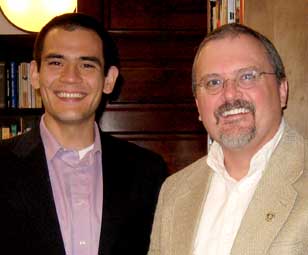A Poynter workshop focues on ethical and privacy issues surrounding the use of pervasive and autonomous technologies
People and institutions increasingly rely on pervasive and autonomous technologies to operate complex systems without thinking much about ethical and privacy issues. A recent workshop at the Poynter Center focused on these issues in a talk entitled, "Securing Emerging Technologies: Medical Devices, Robots, Cars, and More."

Yoshi Kohno (left) and Ken Pimple
The technologies being developed today use very small, relatively inexpensive, wireless-enabled computers and autonomous robots. These technologies will probably result in the near-omnipresence of information gathering and processing devices embedded in clothing, appliances, carpets, and other everyday items to gather data about when and how (and possibly by whom) an item is used. The data can be analyzed, stored, and shared via the Internet. Some of these pervasive technologies will also be autonomous, programmed to make decisions on their own about what data to gather and share and which actions to take, such as sounding an alarm or locking a door.
Ken Pimple, director of Teaching Research Ethics Programs at the Poynter Center, received a National Science Foundation grant in 2009 to host a workshop on the topic. The workshop was held in March 2010 in Cincinnati, Ohio, prior to the annual meeting of the Association for Practical and Professional Ethics, with participants from across the country and Europe. As a follow up to the workshop, Pimple plans to edit a book on the topic of the ethics of pervasive technology.
On Oct. 20, 2010, the Poynter Center concluded the grant project with a presentation in Bloomington by Tadayoshi Kohno, an Assistant Professor in the Department of Computer Science and Engineering at the University of Washington. Kohno spoke on "Securing Emerging Technologies: Medical Devices, Robots, Cars, and More," describing some of the work being done at the University of Washington's CSE Computer Security Lab. Kohno examined several strands of their research, including discoveries of security vulnerabilities in emerging technologies ranging from wireless implantable defibrillators to cars, and he talked about the lab's development of defenses to mitigate these vulnerabilities.
For more information, see https://poynter.indiana.edu/pait/. The project's blog can be found at https://ethicalpait.blogspot.com.